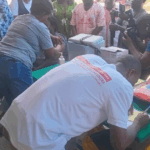
The Western Regional Directorate of the Ghana Health Service (GHS) has taken delivery of 20,000 doses of Mpox vaccine for a 21-day vaccination exercise aimed at helping to save lives and break the transmission cycle.
The Regional Public Health Director, Dr. Gifty Amugi, stated that the 21-day vaccination exercise would involve a four-day intensive phase in most affected communities, followed by a normal delivery phase over the remaining 17 days.
She described the vaccines as safe and approved by the Food and Drug Authority (FDA).
The Region currently has 59 active cases from 13 districts with two deaths.
Dr. Amugi said this at the Sub-national launch of the Mpox Vaccine in New Takoradi in the Western Region, with departmental heads as well as District Health Directors of the service well represented.
The Acting Director-General of GHS, Dr. Samuel Kaba Akoriyea, who launched the Sub-national project, said, “Some 1,800 clinicians and health staff have been trained in the surveillance… we shall keep the campaign and awareness across the country.”
He thanked dedicated workers and volunteers for their commitment to the response activities.
Dr. Akoriyea said the nation has so far recorded three deaths. “Our newest hope is the vaccination; we cannot afford to lose people to this preventable condition.”
All Health workers, close contacts of confirmed cases, and the seven high-risk districts, among others, would be vaccinated first.
Dr. Akoriyea encouraged proper hand washing and avoiding close contact with or handling clothing of affected persons.
He urged all stakeholders to come on board: traditional leaders, Red Cross, opinion leaders, adding, “we all need to be part of the Solution.”
Dr. Marion Okoe, the GHS Western Regional Director, said the vaccination, which was targeted, would complement ongoing surveillance, case management, home care, and other interventions to arrest the virus.
Dr. Frank Lule, from the WHO country office, said the African Region had so far recorded 120 deaths from 30,000 confirmed cases.
He noted that the WHO would continue to provide technical and operational support to end the condition in Ghana.
The team, after the launch, embarked on community engagement and vaccination.



